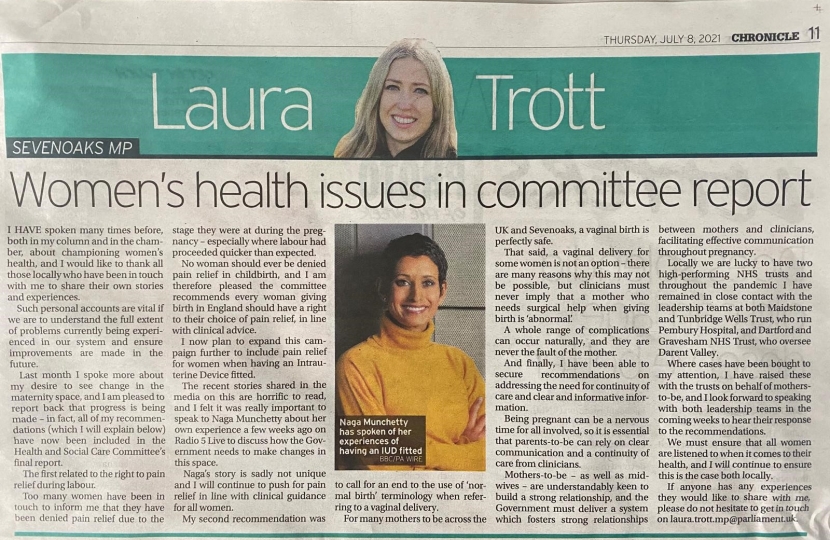I have spoken many times before, both in my column and in the chamber, about championing Women’s Health, and I would like to thank all those locally who have been in touch with me to share their own stories and experiences. Such personal accounts are vital if we are to understand the full extent of problems currently being experienced in our system and ensure improvements are made in the future.
Last month I spoke more about my desire to see change in the maternity space, and I am pleased to be able to report back that progress is being made – in fact, all four of my recommendations (which I will explain below) have now been included in the Health and social Care Committee’s final report.
The first related to the right to pain relief during labour. Too many women have been in touch to inform me that they have been denied pain relief due to the stage they were at during the pregnancy – especially where labour had proceeded quicker than expected. No woman should ever be denied pain relief in childbirth, and I am therefore pleased the Committee recommends every woman giving birth in England should have a right to their choice of pain relief, in line with clinical advice. I now plan to expand this campaign further to include pain relief for women when having an Intrauterine Device fitted. The recent stories shared in the media on this are horrific to read, and I felt it was really important to speak to Naga Munchetty about her own experience a few weeks ago on Radio 5Live to discuss how Government needs to make changes in this space. Naga’s story is sadly not unique and I will continue to push for pain relief in line with clinical guidance for all women.
My second recommendation was to call for an end to the use of ‘normal birth’ terminology when referring to a vaginal delivery. For many mothers to be across the UK and Sevenoaks, a vaginal birth is perfectly safe. That said, a vaginal delivery for some women is not an option – there are many reasons why this may not be possible but clinicians must never imply that a mother who needs surgical help when giving birth is ‘abnormal’. A whole range of complications can occur naturally, and they are never the fault of the mother.
And finally, I have been able to secure recommendations on addressing the need for continuity of carer and clear and informative information. Being pregnant can be a nervous time for all involved, so it is essential that parents to be can rely on clear communication and a continuity of care from clinicians. Mothers to be - as well as midwives - are understandably keen to build a strong relationship, and the Government must deliver a system which fosters strong relationships between mothers and clinicians, facilitating effective communication throughout pregnancy.
Locally we are lucky to have two high performing NHS Trusts and throughout the pandemic I have remained in close contact with the leadership teams at both Maidstone and Tunbridge Wells Trust, (who run Pembury Hospital) and Dartford and Gravesham NHS Trust (who oversee Darent Valley).
Where cases have been bought to my attention, I have raised these with the Trusts on behalf of mothers to be, and I look forward to speaking with both leadership teams in the coming weeks to hear their response to the recommendations.
We must ensure that all woman are listened to when it comes to their health, and I will continue to ensure this is the case both locally. If anyone has any experiences they would like to share with me, please do not hesitate to get in touch on [email protected].

